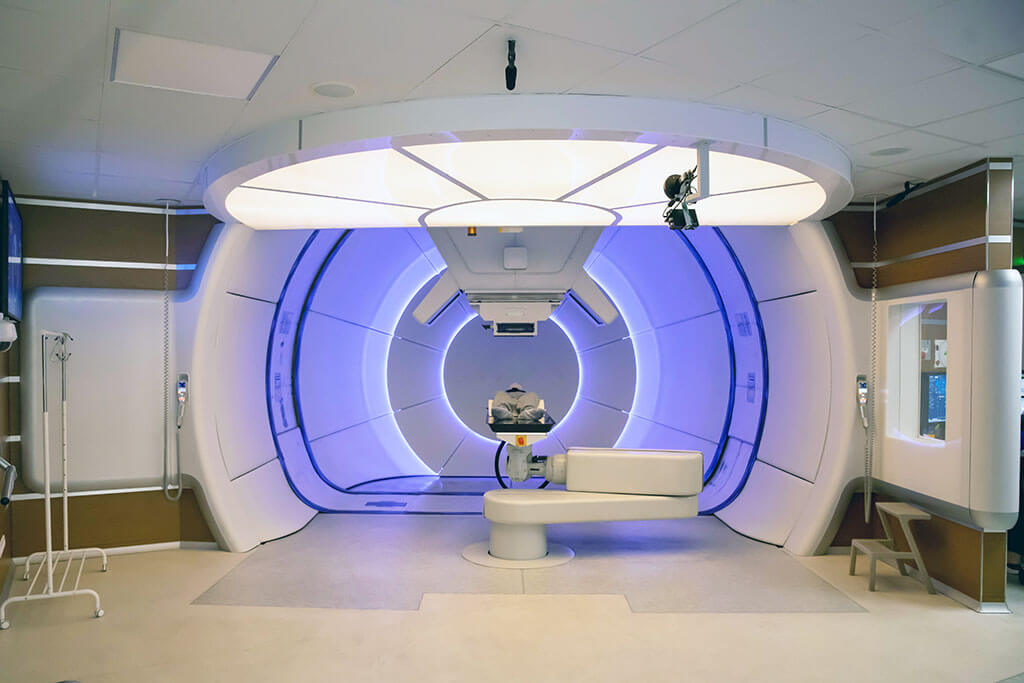Laryngeal cancer is one of the most common head and neck tumors. It develops most often in men under 60 years old. Effective pathology treatment and excellent five-year survival rates are possible in Germany even at the advanced stages of pathology. To achieve this, German hospitals widely use modern methods, which are rarely practiced in other countries of the world.
Standard treatment of stage 4 laryngeal cancer and its disadvantages
Stage 4 laryngeal cancer is diagnosed in cases when metastases up to 6 cm are detected in the cervical lymph nodes (stage 4A), the tumor has invaded the mediastinal organs, covers the carotid artery, or affects the spinal meninges (stage 4B), as well as when metastases in distant organs are also detected (stage 4C).
As a rule, treatment involves the use of radical surgery, chemotherapy, and radiation therapy, but the standard protocols used in many countries have significant disadvantages:
- The classical chemotherapy regimen for laryngeal cancer affects pathological cells and healthy tissues of the body. It results in severe complications and the decreased function of the immune system.
- Radiation therapy causes side effects on the part of normal tissues and organs. They develop during radiation therapy and remain for a long time upon its completion.
- Radical surgery for stage 4 cancer involves the removal of the larynx, thyroid gland, lymph nodes, and other organs. After that, the quality of life of patients considerably worsens.
- All these methods cannot fully prevent cancer recurrence and require long-term treatment and rehabilitation.
German hospitals practice improved modifications of these methods, which are carried out using state-of-the-art equipment. It helps to reduce risks and prevent the development of complications.
Innovative and effective treatment of stage 4 laryngeal cancer
When treating advanced stages of laryngeal cancer, German oncologists use those methods, which can reduce the size of the tumor, and metastases, as well as prolong the life of patients. The treatment regimen usually includes the simultaneous use of several methods to achieve the best results. The most common methods include embolization, modern options for systemic anticancer, and radiation therapy, sparing surgical interventions.
Embolization of metastases
Embolization is a minimally invasive procedure that selectively closes the lumen of the vessels supplying the tumor with blood. It is performed through a small skin incision: the doctor inserts a catheter into the vascular bed and reaches the vessels of the larynx under X-ray guidance. The next step is the injection of emboli – chemicals that block the arteries and disrupt the blood supply to the neoplasm.
Modern hospitals rarely use embolization in its classical form. They mainly use transarterial chemoembolization – blockage of arteries with microspheres saturated with chemotherapy drugs. The last ones penetrate the tumor and destroy it. The procedure allows doctors to get a response in 75% of patients. In 65% of patients, the tumor decreases in size, while 10% of cases show a complete response – the disappearance of the tumor.
Chemoembolization in cancer treatment affects the tumor in the following way:
- Blood circulation in the tumor is impaired – malignant cells quickly die due to the lack of blood supply, as they need a large amount of arterial blood and its nutrients for rapid growth and division.
- The tumor is additionally inhibited by chemotherapeutic agents – they are gradually released from the emboli and destroy cancer cells within a few weeks.
- It has minimal systemic side effects – such treatment is better tolerated than systemic chemotherapy and demonstrates excellent results.
- It provides a high concentration of drugs – such a concentration would not be possible with systemic chemotherapy due to unacceptable toxicity.
Embolization and chemoembolization in laryngeal cancer are used not only as an independent method of local tumor control but also as a preparation for surgery. The technique helps reduce the extent of the surgical procedure, for example, removing only a part of the larynx instead of laryngectomy (radical removal of the larynx).
In addition, embolization is used for the palliative treatment of advanced laryngeal cancer. It is used to stop bleeding from the external carotid artery. The procedure is effective in more than 95% of patients and avoids surgical ligation of hemorrhagic vessels. In such cases, doctors use special spirals.
Radiation therapy
Radiation therapy is usually included in combination therapy for stage 4 laryngeal cancer. Germany uses modern types of irradiation, which allow affecting only tumor cells with an accuracy of a nanometer, without affecting healthy tissues in the process and minimizing damage to the organs in the neck during irradiation.
The most popular methods of radiation therapy in German hospitals are:
- Stereotactic radiation therapy (3D-CRT and IMRT) is a high-precision radiation technique that destroys tumors and metastases within just a few sessions. For this purpose, doctors use state-of-the-art equipment, which makes it possible to accurately determine the coordinates of the tumor and control the intensity and direction of irradiation. The procedure is sparing and does not cause any significant side effects.
- Proton therapy is an advanced method of radiation therapy, which uses proton beams instead of X-rays. The physical properties of the last ones make it possible to effectively impact cancer cells with minimal stress on the body and minimal side effects.
- Brachytherapy involves placing a radiation source close to cells affected by cancer. It helps specialists to use higher doses of radiation.
Radiation therapy is usually appointed before surgery to reduce the size of the tumor, and after surgery irradiate the residual tumor if it has not been removed completely, as well as to reduce the risk of recurrence.
Radiation therapy can be conducted instead of surgery for an inoperable tumor or concomitant pathologies that make surgery dangerous. In severe cases, the patient requires radiation therapy to reduce dysphagia (swallowing disorders) and pain, as well as prevent bleeding and laryngeal stenosis.

Targeted therapy
Targeted therapy (biotherapy) is a type of drug therapy based on selective intervention in intracellular processes. In the course of targeted therapy, doctors use drugs that block signaling pathways, by which cancer cells "understand" that they need to multiply.
Targeted therapy has the following effects:
- Drugs for targeted therapy are selected individually, depending on the sensitivity of cells to them.
- Active substances affect only pathological cells leaving healthy cells intact.
- It allows for reducing the size of the tumor and metastases, including distant ones.
- This type of therapy is well-tolerated by patients.
- It can be well combined with other treatment methods, enhancing their effect.
Drugs targeting epidermal growth factor receptors (EGFR) are often used in cases of advanced stages of laryngeal cancer. They are injected intravenously once a week. The course duration depends on the type of cancer, the spread of the process, and the presence of complications.
Immunotherapy
Immunotherapy is a drug treatment with checkpoint inhibitors (blockers). These drugs are antibodies to PD-1 and PD-L1 proteins. They suppress the activity of molecules on the surface of the tumor cells, which allows them to evade the immune response. According to statistics, these molecules are detected in 85% of cases of laryngeal cancer. These drugs do not have an antitumor effect. Their goal is to make the tumor visible to the immune system. Immunotherapy is usually used for the treatment of metastatic laryngeal cancer.
Immunotherapy for stage 4 laryngeal cancer demonstrates excellent results:
- Tumor size decreases.
- The process of further division of cancer cells stops.
- Immune system activation helps cope with metastases.
- Higher efficacy, as compared to standard chemotherapy.
- Side effects are much less pronounced than in the case of systemic anticancer therapy.
- The life expectancy of patients increases several times.
Checkpoint inhibitors have been approved for use in the US and Europe since 2016. In 2018, there were researches published demonstrating their effectiveness as primary cancer treatment methods. As of today, they are prescribed in combination with chemotherapy for stage 4 laryngeal cancer to improve the patient's survival rate.
DENDRITIC CELL THERAPY - Professor Frank Gansauge
Surgical treatment
The goal of stage 4 laryngeal cancer surgery is to reduce the number of metastases and tumor cells. Whenever possible, the larynx is not completely removed. To reduce the area of intervention, surgery is usually performed upon the completion of radiation or drug therapy. Germany can offer the following equipment for minimally traumatizing surgery:
- Laser resection is the removal of affected tissue with laser beams. The excision is performed without damaging healthy tissues, while the tumor with metastases is removed within a single session. In addition, laser resection has a low risk of bleeding and a short recovery period.
- Transoral robotic surgery is a robot-assisted surgical intervention controlled by a surgical oncologist. Such an approach allows for improving the accuracy of the incisions, reducing the risk of postoperative complications and medical errors.
In some cases, patients may be indicated with extended resection. It involves the removal of most laryngeal tissues and adjacent organs with lymph nodes. To preserve respiratory function, surgeons also perform a tracheostomy during the operation – forming a permanent surgical opening. It is also possible to preserve natural breathing (without a permanent tracheostomy) and restore vocal function. Even after the total larynx removal, it is possible to restore the voice due to the implantation of a voice apparatus (laryngeal prosthesis). Surgery can be followed by radiation therapy, chemotherapy, and other options for systemic drug therapy.
Benefits of treatment in Germany
German oncology hospitals practice innovative therapies and have the very latest drugs and state-of-the-art equipment. They annually conduct clinical investigations , for which the government allocates huge sums of money. All of this allows the doctors to be the first in the introduction of effective treatment methods and to make German medicine one of the best in the world. Each specialist undergoes long-term training and constantly improves his qualifications.
In European hospitals, due attention is paid not only to the duration but also to the quality of human life. After any treatment, each patient undergoes rehabilitation to restore the body as much as possible.
The leading German hospitals that offer treatment for stage 4 laryngeal cancer are:
- University Hospital of Ludwig Maximilian University of Munich, Department of Adult and Pediatric Otolaryngology
- University Hospital Ulm, Department of Adult and Pediatric Otolaryngology, Head and Neck Surgery
- University Hospital Frankfurt-am-Main, Department of Adult and Pediatric Otolaryngology
- University Hospital Würzburg, Department of Adult and Pediatric Otolaryngology, Plastic and Aesthetic Surgery
- University Hospital Jena, Department of Adult and Pediatric Otolaryngology
You can find the full list of the specialized hospitals on the Booking Health website.For stage 4 laryngeal cancer treatment in Germany, laser tumor resection costs about €21,600 on average. The specialized chemotherapy course costs an average of €9,200.
How to undergo treatment in Germany?
In the case of stage 4 cancer , you can undergo treatment in specialized medical centers in Germany with the help of the Booking Health company. We are a leader in the medical tourism market. Our qualified doctors and managers will help you with the following issues:
- Selection of both treatment and diagnostic programs in European hospitals, taking into account previously performed procedures.
- Provision of a minimum cost – the prices for you will be reduced due to the lack of coefficients for foreign patients and additional fees (savings up to 50%).
- Preliminary consultation with a doctor.
- Appointment for a diagnostic examination and treatment on the desired dates.
- Invitation for treatment to quickly get a visa.
- Booking airline tickets, arranging flights and accommodation.
- Personal medical interpreter services.
- Monitoring of invoices for medical services.
- Assistance in buying and forwarding medicines to the country of residence.
- Organization of additional diagnostic examinations or rehabilitation (if required).
To find out the cost of treatment in Europe and detailed information on medical programs for laryngeal cancer, please send your request on the official bookinghealth.com website.
Authors:
This article was edited by medical experts, board-certified doctors Dr. Nadezhda Ivanisova, and Dr. Bohdan Mykhalniuk. For the treatment of the conditions referred to in the article, you must consult a doctor; the information in the article is not intended for self-medication!
Our editorial policy, which details our commitment to accuracy and transparency, is available here. Click this link to review our policies.
Source:
Read:
New Effective Treatments for Stage 4 Cancer (oncology)
Cancer immunotherapy in Germany
Dendritic cell therapy in cancer treatment in Germany - Vaccination against cancer
Article menu:
Don't know where to start?
Contact Booking Health






